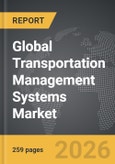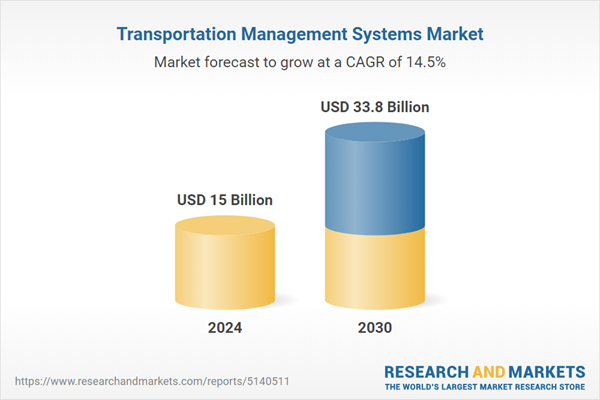Global Transportation Management Systems Market - Key Trends & Drivers Summarized
What Are Transportation Management Systems and Why Are They Essential?
Transportation Management Systems (TMS) are software solutions designed to plan, execute, and optimize the physical movement of goods. TMS platforms provide functionalities such as route planning, carrier management, freight auditing, and real-time tracking. These systems are essential for improving the efficiency and visibility of supply chain operations, reducing transportation costs, and enhancing customer satisfaction. TMS solutions help businesses manage their logistics and transportation activities more effectively, ensuring timely delivery of goods and better utilization of resources. The ability to integrate with other supply chain management systems further enhances the value of TMS in modern logistics.How Have Technological Innovations Shaped the Market?
Technological innovations have significantly influenced the transportation management systems market. The integration of advanced technologies such as Artificial Intelligence (AI), Machine Learning (ML), and Internet of Things (IoT) has enhanced the capabilities of TMS solutions. AI and ML algorithms enable more accurate demand forecasting, route optimization, and predictive maintenance, improving the efficiency and reliability of transportation operations. IoT devices provide real-time tracking and monitoring of shipments, offering greater visibility and control over the supply chain. Cloud-based TMS solutions have increased accessibility and scalability, allowing businesses to deploy and manage their transportation operations more flexibly. These technological advancements have expanded the functionality and applications of TMS solutions, driving their adoption across various industries.Who Are the Major Users and What Are Their Needs?
The major users of transportation management systems include manufacturers, retailers, logistics service providers, and e-commerce companies. Manufacturers use TMS solutions to manage the transportation of raw materials and finished goods, seeking systems that offer robust planning and optimization capabilities. Retailers rely on TMS solutions to ensure timely delivery of products to stores and customers, requiring real-time tracking and efficient carrier management. Logistics service providers use TMS solutions to manage their fleet and optimize their transportation operations, demanding systems that offer comprehensive reporting and analytics. E-commerce companies rely on TMS solutions to handle high volumes of shipments and returns, seeking systems that provide seamless integration with order management and fulfillment processes. Each user group requires TMS solutions that offer reliability, scalability, and integration with their existing systems.What Is Driving Growth in the Transportation Management Systems Market?
The growth in the transportation management systems market is driven by several factors, including the increasing complexity of supply chains, the rise of e-commerce, and advancements in technology. The growing complexity of global supply chains, driven by factors such as globalization and increasing consumer demands, has necessitated the use of advanced TMS solutions to manage transportation operations more effectively. The rise of e-commerce has significantly increased the volume and complexity of shipments, driving the demand for efficient and scalable TMS solutions. Advancements in technology, including AI, ML, and IoT, have enhanced the capabilities of TMS solutions, making them more valuable for businesses. Additionally, the increasing focus on reducing transportation costs and improving customer satisfaction has further fueled the adoption of TMS solutions.Report Scope
The report analyzes the Transportation Management Systems market, presented in terms of market value (US$ Thousand). The analysis covers the key segments and geographic regions outlined below.- Segments: Transportation Mode (Roadways, Railways, Airways, Waterways); Deployment (On-Premise, Cloud); End-Use (Manufacturing, Logistics, Retail & eCommerce, Government Organizations, Other End-Uses).
- Geographic Regions/Countries:World; United States; Canada; Japan; China; Europe (France; Germany; Italy; United Kingdom; and Rest of Europe); Asia-Pacific; Rest of World.
Key Insights:
- Market Growth: Understand the significant growth trajectory of the Roadways Transportation segment, which is expected to reach US$14.6 Billion by 2030 with a CAGR of a 14.4%. The Railways Transportation segment is also set to grow at 13.5% CAGR over the analysis period.
- Regional Analysis: Gain insights into the U.S. market, valued at $4.1 Billion in 2024, and China, forecasted to grow at an impressive 13.5% CAGR to reach $5.1 Billion by 2030. Discover growth trends in other key regions, including Japan, Canada, Germany, and the Asia-Pacific.
Why You Should Buy This Report:
- Detailed Market Analysis: Access a thorough analysis of the Global Transportation Management Systems Market, covering all major geographic regions and market segments.
- Competitive Insights: Get an overview of the competitive landscape, including the market presence of major players across different geographies.
- Future Trends and Drivers: Understand the key trends and drivers shaping the future of the Global Transportation Management Systems Market.
- Actionable Insights: Benefit from actionable insights that can help you identify new revenue opportunities and make strategic business decisions.
Key Questions Answered:
- How is the Global Transportation Management Systems Market expected to evolve by 2030?
- What are the main drivers and restraints affecting the market?
- Which market segments will grow the most over the forecast period?
- How will market shares for different regions and segments change by 2030?
- Who are the leading players in the market, and what are their prospects?
Report Features:
- Comprehensive Market Data: Independent analysis of annual sales and market forecasts in US$ Million from 2024 to 2030.
- In-Depth Regional Analysis: Detailed insights into key markets, including the U.S., China, Japan, Canada, Europe, Asia-Pacific, Latin America, Middle East, and Africa.
- Company Profiles: Coverage of players such as BluJay Solutions, CTSI-Global, Descartes Systems Group, Efkon AG, JDA Software, Inc. and more.
- Complimentary Updates: Receive free report updates for one year to keep you informed of the latest market developments.
Some of the 13 companies featured in this Transportation Management Systems market report include:
- BluJay Solutions
- CTSI-Global
- Descartes Systems Group
- Efkon AG
- JDA Software, Inc.
- Manhattan Associates, Inc.
- MercuryGate International, Inc.
- Oracle Corporation
- SAP SE
- TMW Systems, Inc.
This edition integrates the latest global trade and economic shifts into comprehensive market analysis. Key updates include:
- Tariff and Trade Impact: Insights into global tariff negotiations across 180+ countries, with analysis of supply chain turbulence, sourcing disruptions, and geographic realignment. Special focus on 2025 as a pivotal year for trade tensions, including updated perspectives on the Trump-era tariffs.
- Adjusted Forecasts and Analytics: Revised global and regional market forecasts through 2030, incorporating tariff effects, economic uncertainty, and structural changes in globalization. Includes historical analysis from 2015 to 2023.
- Strategic Market Dynamics: Evaluation of revised market prospects, regional outlooks, and key economic indicators such as population and urbanization trends.
- Innovation & Technology Trends: Latest developments in product and process innovation, emerging technologies, and key industry drivers shaping the competitive landscape.
- Competitive Intelligence: Updated global market share estimates for 2025, competitive positioning of major players (Strong/Active/Niche/Trivial), and refined focus on leading global brands and core players.
- Expert Insight & Commentary: Strategic analysis from economists, trade experts, and domain specialists to contextualize market shifts and identify emerging opportunities.
Table of Contents
Companies Mentioned (Partial List)
A selection of companies mentioned in this report includes, but is not limited to:
- BluJay Solutions
- CTSI-Global
- Descartes Systems Group
- Efkon AG
- JDA Software, Inc.
- Manhattan Associates, Inc.
- MercuryGate International, Inc.
- Oracle Corporation
- SAP SE
- TMW Systems, Inc.
Table Information
| Report Attribute | Details |
|---|---|
| No. of Pages | 259 |
| Published | January 2026 |
| Forecast Period | 2024 - 2030 |
| Estimated Market Value ( USD | $ 15 Billion |
| Forecasted Market Value ( USD | $ 33.8 Billion |
| Compound Annual Growth Rate | 14.5% |
| Regions Covered | Global |









